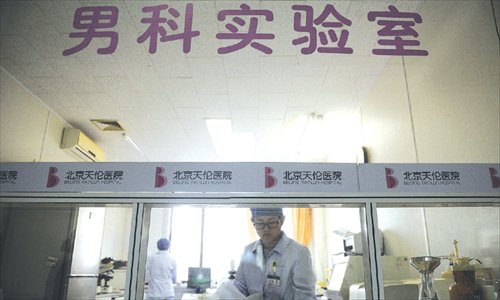Sterility fears

A couple look at pictures of newborn babies on the wall in the Beijing Tianlun Sterility Hospital on May 4. Photo: Li Hao/GT
As some couples consider whether to have a second child amid the recent relaxation of China's family planning policy, others are finding that having even a single child is beyond their grasp.
While media headlines have focused on the growing cost of raising a child, a second, more insidious reason for a lack of children has been on the rise - infertility.
Experts agree that infertility has already become China's third most serious health condition after cancer and cardiovascular diseases in terms of its complex causes, prevalence and impact.
Some medical experts have put estimates of the number of infertile people at beyond 50 million. Physicians say they have witnessed a surge in the number of patients.
A survey by the China Population Association in 2012 showed that 12.5 percent of the population of childbearing age, or more than 40 million Chinese, were infertile. But two decades ago, the infertility rate was only 3 percent.
Estimates by the World Health Organization (WHO) put the number of infertile people worldwide at between 50 million and 80 million. And the WHO says there is evidence that the infertility rates that are generally quoted are actually lower that the real figure.
Some argued that over fertility, rather than infertility, should be the focus of family planning policy-makers in an overpopulated country. However, health experts rebutted the idea.
"The causes of infertility range from unhealthy lifestyles to unsafe abortions and pollution, and these should be a nationwide concern," Wang Hong, chief physician of the Beijing Tianlun Sterility Hospital, told the Global Times.
As the technology improves, many infertile couples can have a baby by assisted reproductive technologies, including in vitro fertilization (IVF), embryo transfer and intracytoplasmic sperm injection.
"But fetuses obtained through unnatural means are likely to have more health risks, which will influence the health quality of the next generation," Wang admits.

Technicians work in a laboratory catering to male patients at the Beijing Tianlun Sterility Hospital. Photo: Li Hao/GT
Distinct fertility problems
The medical definition of infertility is the failure to conceive following 12 months of unprotected intercourse. Men and women are affected almost equally with tubal blockages and declining sperm counts, commonly cited as the causes.
Bad habits like smoking and excessive drinking, work pressures and environmental pollution have often been cited as reasons for infertility. But China also has other specific reasons.
According to statistics from the Medical Reproduction Center of Xiangya Hospital, Central South University in Hunan Province, the number of fertility patients increased sharply in recent years. The total number of outpatients grew to more than 100,000 last year from less than 30,000 five years ago, according to the Changsha Evening News.
In the past, the majority were above 35, but now there are more and more young couples in their 20s, accounting for almost 50 percent of the total number, the newspaper reported.
"Tubal blockages and endometrial thinness caused by repeated abortions and casual sex is the prime cause for female infertility," Wang said.
National Health and Family Planning Commission data showed that at least 13 million abortions are carried out in China each year, not including the 10 million abortions induced via pills or in private medical institutes. Half of those women have had abortions more than twice and most are unmarried adolescents.
"The lack of sexual education and contraception knowledge, people's preference for boys and the abuse of ovulation induction drugs to have multiple births have all contributed to the high rate of abortions," Wang said.
Xu Yimin, chief doctor from the HarMoniCare Women & Children's Hospital, pointed out another problem. "The people have now become better educated and have more extensive knowledge. Meanwhile, their expectation of having a good birth has also grown. Thus, stress rises, which increases the difficulty of conception," Xu, also Council member of China Healthy Birth Science Association, told the Global Times.
Other reasons like excessive weight loss, exposure to low-level radiation and later marriages are also to blame.
A survey jointly conducted by the Beijing Youth League Committee and Beijing Youth Federation last year showed that China has 17.78 million unmarried people aged between 30 and 39, with women accounting for one third.
The prime time for women to bear children is in their 20s to at most 35, doctors said.
"Their reproductive ability deteriorates as they get older," Xu said.
Australian fertility expert Clare Boothroyd said the age of men also has an impact.
A woman aged over 35, who has a partner 5 years older, has a 30 percent lower chance of getting pregnant than if she was with someone the same age or younger, she told News Corp Australia.
With over 30 years of experience, Xu said she has also observed increasing fetal development failures. "The reasons are complex. But one thing to be alert about is the widespread deterioration in the health of young people, which is vital to reproductive ability and healthy childbirths," Xu said.
"Some infertility problems inevitably occur with fast-paced lifestyles and urbanization, but some can be avoided or reduced if we take timely actions," Wang noted, adding that the pervasive infertility also indicates a declining level of fitness among the population.
She compared students to those in neighboring countries such as Japan and South Korea, citing reports that their average statures surpass those of Chinese and that they have far fewer nearsighted students.
Since 2009, China has started to provide folic acid free of charge to women before their pregnancy. "But on a trip to Japan I found that different health care products are available for free to citizens of different age groups," she said.
Widespread consequences
A WHO report pointed out that infertility is related to a wide range of social issues, including public, social and psychological health as well as moral issues, and said it can lead to severe economic deprivation and social isolation.
In China, the concept of carrying on the family line is deeply ingrained, so the consequences can sometimes be more severe.
"There are three major offenses against filial piety, and not producing an heir is the worst," reads a verse from Mencius. Many Chinese people, especially in rural areas, have high expectations of an heir and harsh attitudes toward those who do not produce one.
Li Chun (pseudonym), 36, from a village in Hunan Province, got married in 2006 but his wife was found to have a tubal blockage. In October 2012, they had twins via IVF at a Shenzhen hospital.
"Before, my parents felt that it was a shame and always avoided the topic of our infertility when talking with neighbors," he told the Global Times. "But after the twins were born, we took them back to our hometown and held a big banquet. My parents felt proud and elated again."
They had turned to at least four hospitals in Hunan and Guangdong provinces and spent more than 60,000 yuan, nearly all savings the couple had earned by being migrant workers.
"The expenditure was a minor issue compared with the stress. The whole treatment process was a torment. When one trial failed, we saved money for the next. But the pressure piled up with each failure. Nevertheless, we never thought of giving up," he said. They succeeded at the third trial.
Li is one of many who have sought assisted reproductive technologies (ARTs). But these don't always work and sometimes, a failure to conceive can cost these people everything.
Huang Wanxiang, 36, hanged herself on March 20, 2012 in Shenzhen when her husband filed to divorce after two ART failures and one spontaneous abortion, according to the Southern Metropolis Daily.
Li Hongxiang, a marriage law expert from Jilin University, said that young people's reproductive concepts have greatly changed compared with years ago.
"In many places it has become the same to give birth to a boy or a girl, and there are other couples which eschew having children altogether. But in some regions, having a child, especially a boy, is particularly important," Li told the Global Times.
Infertility can trigger family disruption even though the law doesn't support that reason for divorce. On March 4, a court in Wuxuan county, Guangxi Zhuang Autonomous Region, dismissed a lawsuit by Liu Yan, who filed for divorce after finding her husband was infertile.
Treatment chaos
As the reliance on ARTs grows, medical services targeting infertility treatment have flourished across China. But many of them are believed to be false advertisements, or the practitioners are not qualified.
According to the official statistics, China has ratified a total of 356 medical institutes in 30 provincial-level regions to carry out ARTs, with Guangdong Province at the top of the list with 46.
In 2003, there were only 18 institutes qualified for ARTs.
According to some reports, around 15,000 babies are born each year from IVF in Beijing alone.
The number of outpatients at the Center of Reproductive Medicine of the Third School of Clinical Medicine of Peking University exceeded 370,000 in 2012.
However, the increase in the number of hospitals still appears short. Due to limited official resources and channels, a large profitable underground chain of sperm and egg donation and surrogacy has developed in some southern cities, according to the City Sun, a Shandong-based newspaper.
There are also special agents who are in charge of collecting customers and donors through the Internet, the newspaper added.
Unlicensed institutes offering ARTs have many safety risks.
A patient who asked to remain anonymous said he and his wife had turned to several infertility hospitals, but they all failed to find exact reasons. "My wife's first pregnancy failed when we surprisingly found that the fetus stopped growth at two months old. Then we began to seek a medical diagnosis.
"But the initial treatment was the result of misdiagnosis as the situation happened again in our second pregnancy."
At last, they had their problem solved in a large qualified hospital. A baby daughter was born in their third pregnancy.
"We pointlessly spent lots of time and money. We could have ended the agony earlier," he said.
Newspaper headline: World's most populous country now haunted by infertility due to poor sex education